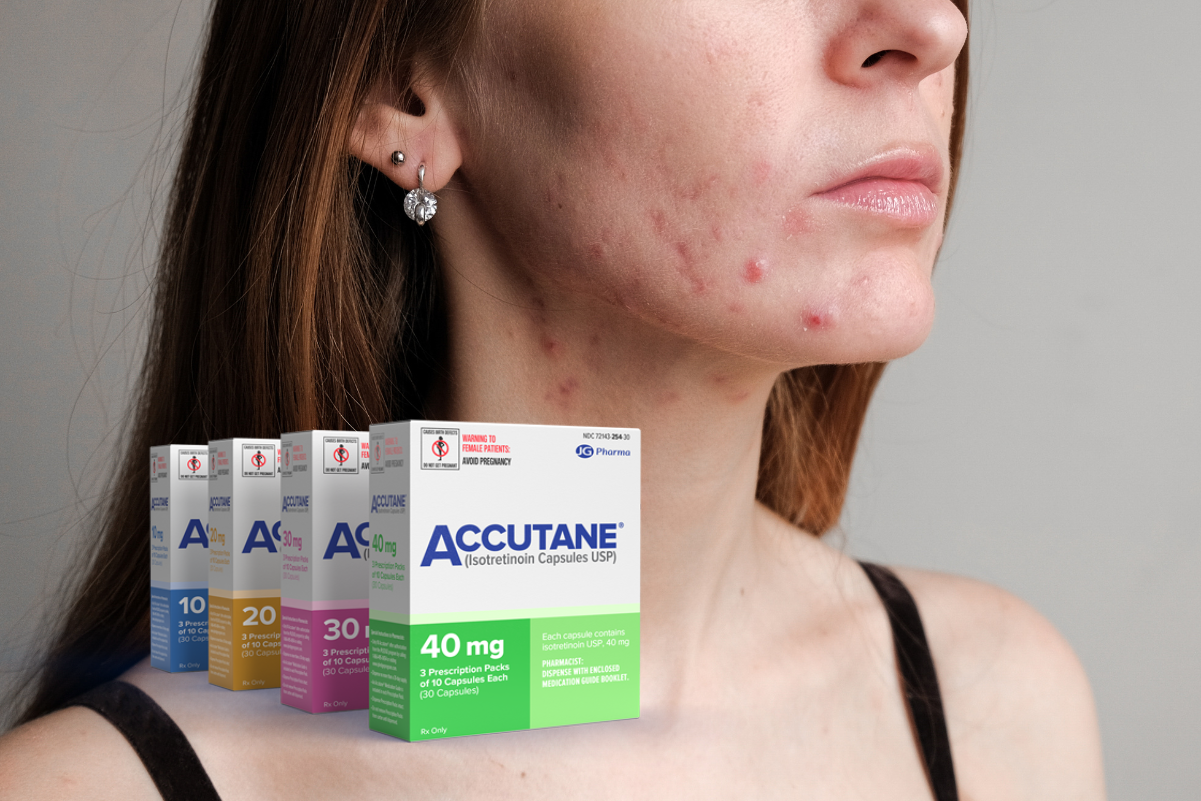If you have gone through multiple acne treatments without success or have struggled with acne scarring, you’ve probably heard of Accutane (the brand name for isotretinoin). Accutane is a powerful medication that can drastically improve acne, and in some cases even cure it! If you are considering Accutane as a treatment option, or if you are just curious about it, here’s what to know:
What is Accutane?
Accutane is a capsule medication taken by mouth that is derived from vitamin A and is used to treat moderate or severe cases of acne. Accutane can treat all types of acne, including comedonal (blackheads and whiteheads), inflammatory (pimples and pustules), and nodulocystic acne. Accutane is also a helpful treatment for acne that has not responded to other types of acne treatments (topical medications, oral antibiotics, or hormonal therapies). Accutane works so well against acne because it uniquely targets the 4 known contributing causes of acne:
- Accutane lowers excess oil production in the skin.
- Accutane decreases inflammation in the skin.
- Accutane encourages more rapid skin cell turnover, in turn preventing clogged pores.
- Accutane reduces acne-causing bacteria.
Accutane can lead to long-term acne control, and in some cases even cure it permanently.
What can I Expect During Treatment?
-
Common side effects
-
Dryness- Almost everyone gets some degree of dryness while on Accutane. This includes dry skin, dry lips (chapped), dry eyes, and dry nasal passages (which can lead to nosebleeds). Aggressive moisturizing is key in tolerating this side effect.
-
Sun sensitivity- This medication makes it very easy to sunburn- even if you’re someone who usually doesn't get sunburns. Sometimes in a place like Minnesota, it's best to strategize taking this medication in the fall or winter, when there is less intense sunlight.
-
Joint and muscle aches- This is often more noticed in more active patients, especially after working out.
-
Dryness- Almost everyone gets some degree of dryness while on Accutane. This includes dry skin, dry lips (chapped), dry eyes, and dry nasal passages (which can lead to nosebleeds). Aggressive moisturizing is key in tolerating this side effect.
-
iPLEDGE enrollment: Accutane causes severe birth defects if taken during pregnancy, so all who take Accutane have to be enrolled in the iPLEDGE program. This federal program requires strict birth control measures with the aim of preventing pregnancy on this medication. On a monthly basis for the entire treatment course, patients of childbearing potential must commit to two forms of birth control if sexually active, or they must pledge sexual abstinence while on this medication. Those rules also apply for the month leading up to and the month after isotretinoin treatment.
-
Monthly appointments: Accutane has a long list of potential side effects. Therefore, it is federally required to have a monthly check-in visit with a dermatology provider in order to receive each month’s prescription. During each visit, your dermatology provider will review common side effects, assess your acne’s progress, and monitor your overall health.
- Lab monitoring: Patients of childbearing potential are required to have monthly pregnancy tests to demonstrate that they are not pregnant in order to be prescribed Accutane. Liver enzymes and a fasting lipid panel are also monitored before starting Accutane and 2 months after starting Accutane.
Does Accutane impact mood or mental health?
For most people, no. However, some people that take Accutane have reported new symptoms of depression and even suicidal thoughts. It can be hard to tease apart if Accutane is the cause in every one of those cases, but prioritizing your mental health always comes first. Open and honest communication with your dermatology provider about your mental health is absolutely critical while on Accutane.
How long will I be on Accutane?
The dosing for Accutane is based on your weight, with the goal of achieving 120-150 mg/kg total in a tolerable and appropriate manner.. The average Accutane course is 5 to 6 months, though this may need to be adjusted depending on side effect tolerance and individual needs.
What can I expect after Accutane?
Generally, most can expect long term improvement in their acne, with clearer skin and fewer breakouts. Some may even experience cure. A small minority of patients with stubborn acne may require another round of isotretinoin in the future (at least a year after completing their first course). If you have acne scarring, Accutane does not make existing scars go away, but it does help shut down the causative acne, so you can focus on scarring treatment down the road.
Accutane is not the medication of choice for everyone, but it can be life-changing for the right person and is one of the most effective acne treatments available. If you are wondering about treatment options for your acne, including Accutane, book an appointment with one of our dermatology providers. We’d be happy to help!





